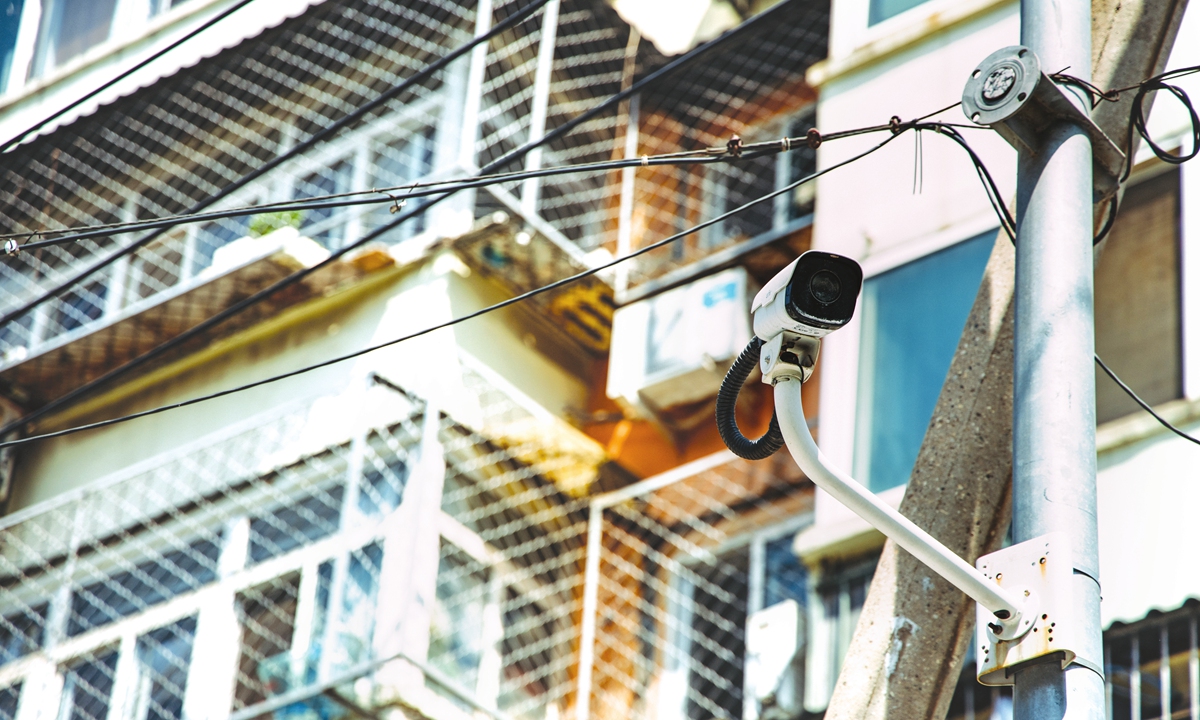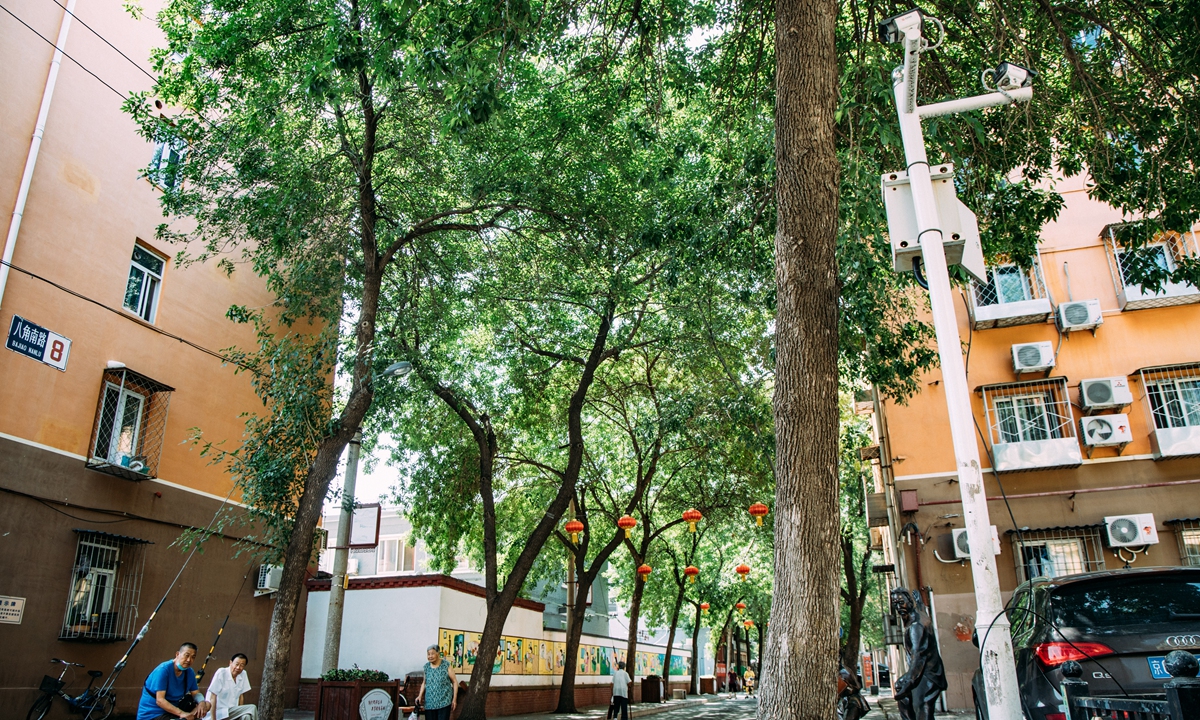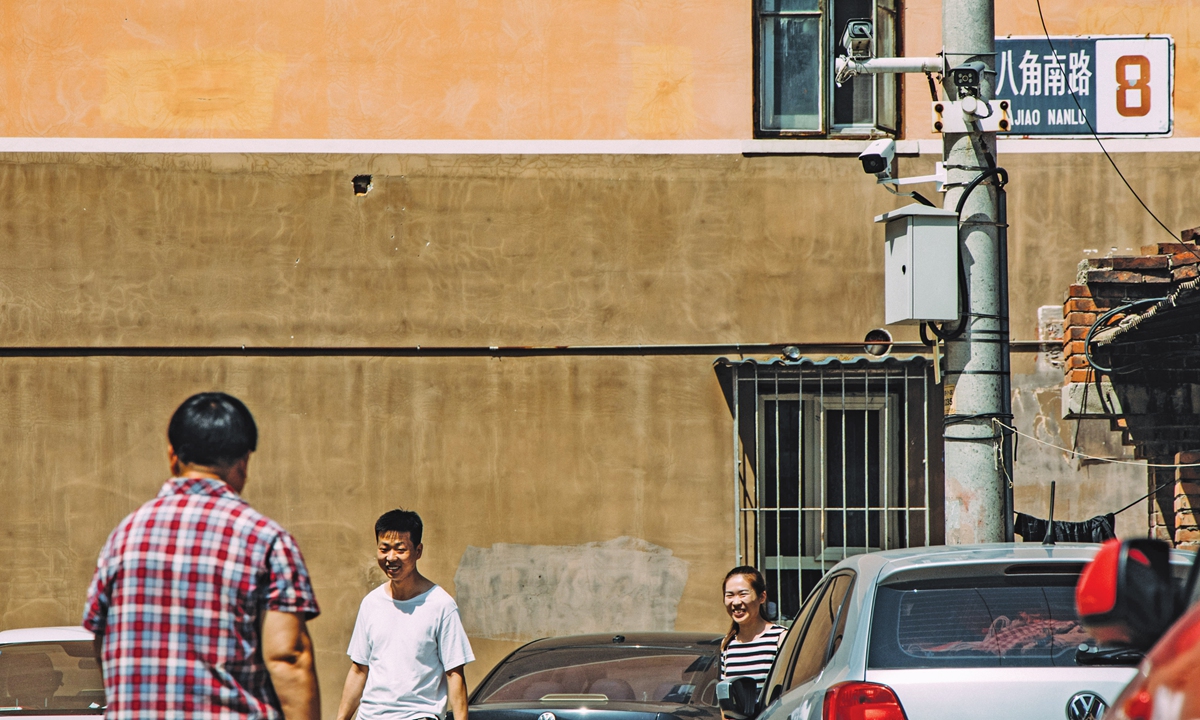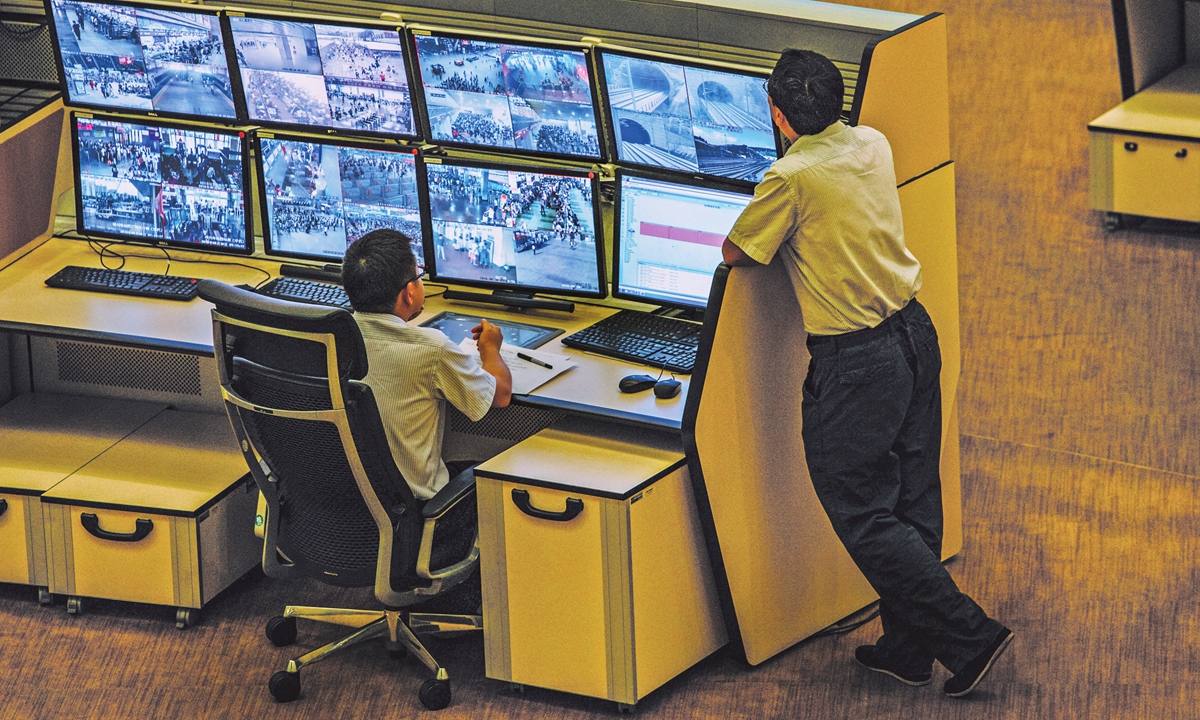China comfortably leads world 'smart city' construction thanks to CCTV cameras services
By Huang Lanlan and Li Lei Source: Global Times Published: 2020/8/3 20:05:56

Surveilliance cameras in a community of Beijing Photo: Li Hao/GT
China is leading the world in building smart cities which include public security camera installations that are used to ensure safety. Chinese experts and officials have refuted Western media's clichés smearing Chinese cities for installing closed-circuit television (CCTV) cameras to "monitor people" as complete nonsense. Such allegations have reappeared to serve their agenda of attacking China's smart city construction.
In some China's biggest cities such as Shanghai and Beijing, the local governments install CCTV cameras to serve citizens rather than "monitor" them, local officials told the Global Times.
O2O service
Shanghai has built several urban operation and management centers for its grassroots communities - digital platforms that provide effective 0nline-to-offline (O2O) services for residents based on the data from the CCTV cameras and local administrative bodies.
In Shanghai's 1.52-square-kilometer Jiangsu Road sub-district, where 80,000 residents live, there are more than 600 cameras installed on 18 main roads and streets. The CCTV cameras identify rubbish on the roads and improperly parked bikes, and record traffic conditions, Zhang Zheren, director of the sub-district's urban operation and management center, told the Global Times.
By scanning the roads every 30 minutes, the cameras can find garbage, take photos of it and send the photos to the operation center, Zhang said. The center then automatically delivers the digital photos to the local sanitation department, which later assigns staff to move the garbage.
"The whole process lasts only 30 minutes, one-quarter of the time without the cameras," Zhang said. In the past, it usually took hours for the residents who encountered the rubbish and reported it to local service hotlines to get help. Zhang and his colleagues are planning to broaden the functions of the cameras, such as detecting water-logging on roads after heavy rain. All the functions are designed to offer local citizens more convenience.
"It's laughably ridiculous that they [Western media] say we use the cameras to 'monitor' people," Zhang said. "All we want is to create a safe and friendly environment for our citizens."
Widely used
Surveillance cameras are widely used in many aspects of China's society.
In 2018, North China's Hebei Province installed 4,339 cameras in farming areas to prevent farmers from burning crop straws, people.cn reported as a part of the local "beat air pollution" campaign. Official said the surveillance system is more accurate and responds more rapidly than regular surveillance cameras.
The Chinese Ministry of Education has ordered all kindergartens, elementary and secondary schools to be equipped with surveillance systems by the end of 2020 to further improve security on campus.

Surveilliance cameras in a community of Beijing Photo: Li Hao/GT
The financial and technological threshold for installing a camera is relatively low in China, the public found. On China's leading shopping website taobao.com, the overwhelming majority of surveillance camera products are priced less than 300 yuan ($43), with many online vendors peddling the installation process as "fast and simple."
Occasional cases of individuals and organizations installing cameras in public places have raised concerns on possible privacy invasions and disclosures.
A college in Southwest China's Guizhou Province installed cameras inside classrooms in 2015 to reduce student absenteeism, which received backlash from some students, local newspaper Guiyang Daily reported in April 2016.
Securing safety
The current distribution and number of surveillance cameras in China is reasonable in order to ensure public security, Xie Yongjiang, executive director of the internet management and legislation research center of Beijing University of Posts and Telecommunication, told the Global Times.
"Full coverage of some public venues with surveillance cameras is critical for ensuring public security, such as solving a crime in a more effective and accurate manner by acquiring information," he noted.
Beijing police responded to some 82,000 cases in 2019, a 9.2 percent year-on-year growth, with a 100 percent homicide closure rate for five consecutive years, and a 100 percent robbery case closure rate, according to a report released by the Beijing Public Security Bureau on January 16.

Surveilliance cameras in a community of Beijing Photo: Li Hao/GT
Yuan Lin, an official with the Beijing public security bureau, said the robbery case closure rate in 2019 reached a new high, with the closure rate of burglary and car theft reaching the highest, and the registered number of the two respective crimes dropping in the past decade.
Some media coverage depicts China's populous major cities as being "monitored" with people living under "a vast surveillance system." "The accusation is groundless and unreasonable," said Xie, noting that some Western countries and their media hold a double standard on whatever China does, including using modern technology in city management.
"Such a high-tech product [surveillance cameras] is a convenient and effective tool in city management, which has been widely used in the world," he said.
The US has the most CCTV cameras per capita in the world with 15.28 cameras per 100 people, according to a recent report by PreciseSecurity.com. A 2020 mid-year crime index released by user-contributed database Numbeo showed that the Chinese mainland ranked as the 33th safest region among all the 133 listed countries and regions, surpassing many developed countries such as Germany, Norway and the US.
Steps taken to balance privacy and safety with legislation, transparency
China has stepped up its efforts in balancing public security and citizens' privacy.
An official with the Chinese Cybersecurity Association said China attaches great importance to legislation and measures to protect citizens' privacy, which is now secure under the protection of relevant terms in China's Civil Code and Personal Information Protection Law.
Regional versions of the "public video image and information system management regulation," drafted by the Ministry of Public Security in 2016, have been implemented in many provinces including Anhui, Yunnan, Guangdong, Hubei and Inner Mongolia, according to media reports.
The regulation bans the installation of cameras at places that may violate a person's privacy. It requires cameras are installed at locations with a reasonable distance from residential buildings.

The dispatching center for high speed trains in Beijing Photos: Li Hao/GT
The CCTV cameras people see in some private spaces, such as in the residential areas, are usually installed by local property management companies with the permit of the house-owner committees, explained an anonymous information management official in Shanghai.
"The [local] government has never installed cameras in non-public places," he told the Global Times.
On Shanghai's open data platform data.sh.gov.cn, the public security administration uploaded the detailed locations of the city's 26,774 road cameras, which are accessible to everyone. The last update of the information was on January 2, the platform shows.
These cameras have contributed to Shanghai's public security, helping local police track and arrest 60,000 criminal suspects in 2016, according to data from the Shanghai police and in contrast with a report released British technology website Comparitech saying there's "little correlation" between the CCTV cameras and crime or safety.
Li Yunlong, a professor at the Institute for International Strategic Studies, Party School of the Central Committee of CPC, pointed out most Chinese people are willing to give up a reasonable part of privacy for the public security, which is because Chinese people trust the government and believe the government is designed to protect and serve the people.
Western countries would assume that the Chinese government will definitely use the collected information to violate people's rights, which is a groundless and subjective conjecture, said Li.
"The Western countries are so concerned for Chinese people's privacy, but they never felt that way and the truth shows that no privacy-violation crimes have happened with people's information in the hands of the government," Li said, noting that on the contrary, the government has had an excellent performance in terms of cracking down on crimes and safeguarding public security.
Newspaper headline: Safer streets
RELATED ARTICLES: